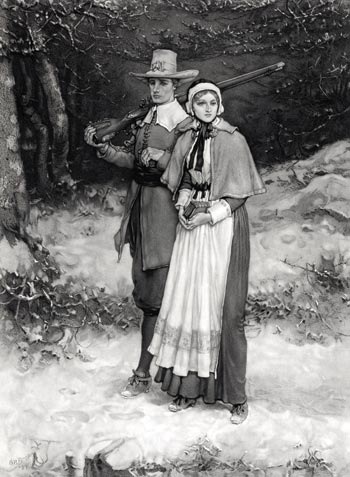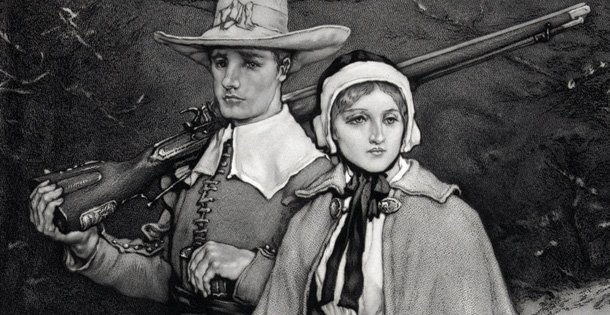
Do you have complicated feelings about Thanksgiving? Maybe your ancestors were among this continent’s indigenous peoples, and you have good reason to be rankled by thoughts of newly arrived English colonists feasting on Wamapanoag-procured venison, roasted wild turkey, and stores of indigenous corn. Or maybe Thanksgiving marks the beginning of a holiday season that brings with it the intricate emotional challenges of memory, home, and family.
If you’re someone who feels a sense of angst, foreboding, or misery about this time of year, take heart: American history is on your side.
The truth of our history is that only a small minority of the early English emigrants to this country would have been celebrating as the New England Puritans did at the first Thanksgiving feast in 1621.
A thousand miles south, in Virginia and the Carolinas, the mood and the menu would have been drastically different — had there ever been a Thanksgiving there. Richard Frethorne, an indentured servant in the Virginia colony during the 1620s, wrote in a letter: “Since I came out of the ship, I never ate anything but peas, and loblollie (that is, water gruel).”
And don’t imagine for a second that those peas Frethorne was gobbling down were of the lovely, tender green garden variety dotted with butter. No, in the 1620s, Frethorne and his friends would have subsisted on a gray field pea resembling a lentil.
“As for deer or venison,” Frethorne wrote, “I never saw any since I came into this land. There is indeed some fowl, but we are not allowed to go and get it, but must work hard both early and late for a mess of water gruel and a mouthful of bread and beef.”

Frethorne’s letter is a rare surviving document reflecting the circumstances of the majority of English colonists who came to North America in the 17th century. The New England Puritans, after all, comprised only 15 to 20 percent of early English colonial migration.
Not only did the majority of English colonial migrants eat worse than the Puritans, but also their prayers (had they said any) would have sounded decidedly less thankful.
“People cry out day and night,” Frethorne wrote. “Oh! That they were in England without their limbs — and would not care to lose any limb to be in England again, yea though they beg from door to door.”
English migrants in Virginia had good reason not to feel grateful. Most came unfree, pushed out of England by big economic forces that privatized shared pastures and farmlands and pushed up the prices of basic necessities. By the 17th century, more than half of the English peasantry was landless. The price of food shot up 600 percent, and firewood by 1,500 percent.
Many peasants who were pushed off their homelands built makeshift settlements in the forests, earning reputations as criminals and thieves. Others moved to the cities, and when the cities proved no kinder, they signed contracts promising seven years of hard labor in exchange for the price of passage to the Americas, and were boarded onto boats. A trip to Virginia cost Frethorne and others like him six months’ salary and took about 10 weeks. One-quarter to one-half of new arrivals to Virginia and the Carolinas died within one year due to diseases like dysentery, typhoid, and malaria. Others succumbed to the strain of hard labor in a new climate and a strange place — an adjustment process the English described as “seasoning.” Only 7 percent of indentures claimed the land that they had been promised.
Most of these common English migrants did not read or write, so vivid and revealing letters like Frethorne’s are rare. But in the research for my book Why We Left: Untold Stories and Songs of America’s First Immigrants, I learned how English migrants viewed their situation through the songs they sang about the voyage across the Atlantic Ocean. Those songs survived hundreds of years by word of mouth before they were written down in the 20th century.
These were not songs of thankfulness — not by a long shot. They were ballads full of ghastly scenes of the rejection, betrayal, cruelty, murder, and environmental ruin that had driven them out of England — and of the seductive but false promises that drew them to America. These 17th-century songs planted the seeds for a new American genre of murder and hard-luck ballads that was later picked up and advanced by singers like Johnny Cash, whose ancestors, like mine, were among those early hard-luck migrants from England to America.
So if you find yourself a little blue this holiday season, take your marshmallow-topped sweet potatoes with a liberal dose of the Man in Black, and reassure yourself that you are a part of a long, long American tradition.
Become a Saturday Evening Post member and enjoy unlimited access. Subscribe now



